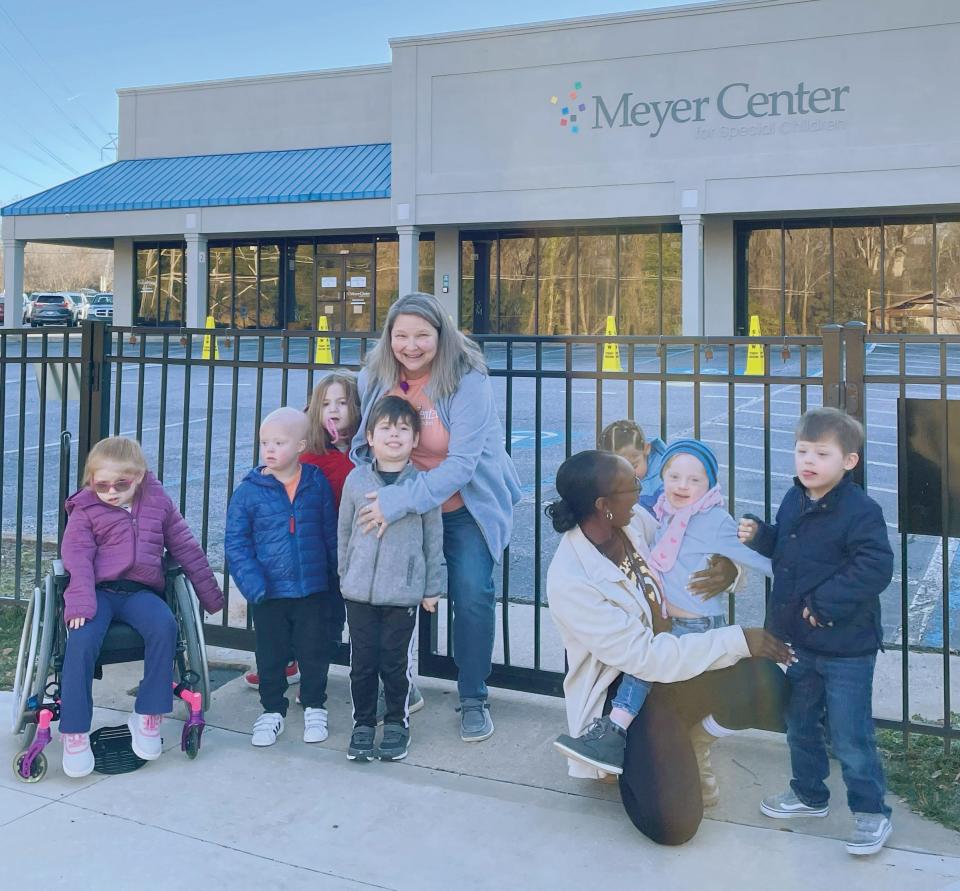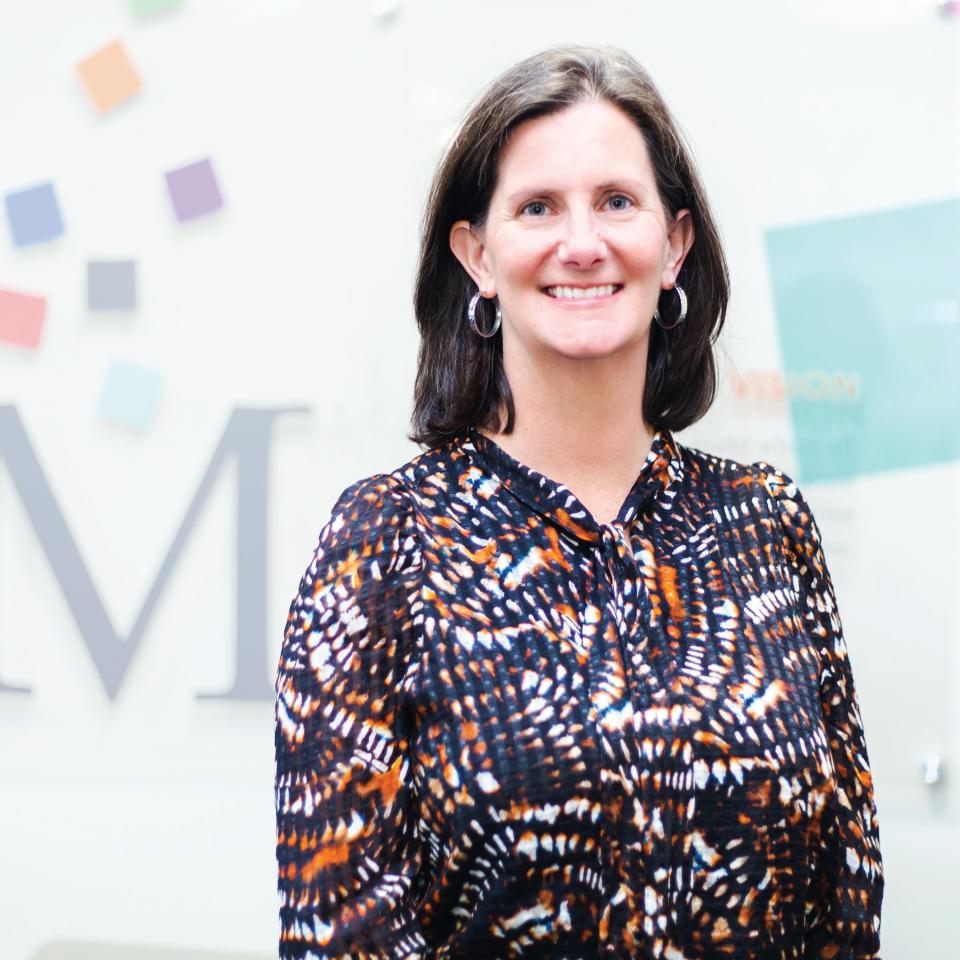After 70 Years, Children With Disabilities Still Learning And Growing At Meyer Center
People move to the Upstate for jobs, economic prospects, even the arts or foodie scene. Others choose Greenville so that their children can access the care, therapies and opportunities offered at Meyer Center for Special Children.
“We’ve had families move here specifically because our services are so unique,” says Meta Hendricks, who became Executive Director of Meyer Center five years ago.
Meyer Center’s students have a range of disabilities; most reside in Greenville, but also Spartanburg, Anderson and Pickens counties.
And at least one family moved from New York City.

“They didn't feel like their child was getting the best care, not under one roof,” Hendricks says.
They traveled south to tour Meyer Center, then told Hendricks:
“We felt the love and acceptance. We committed that day to moving here so that our kid had the opportunity to be in that environment.”
The school was founded in 1954 by a local surgeon, Dr. Leslie Meyer, under the auspices of United Cerebral Palsy and located at Greenville General Hospital (now Prisma Health).
This year’s 70th anniversary is meaningful, not just because of the school’s longevity. Children with disabilities could not attend public schools until 21 years after Meyer Center opened – when Congress passed what is now the Individuals With Disabilities Education Act.
“It was commonly thought that children with disabilities couldn't understand, and they couldn't learn,” Hendricks says. “That’s not true at all.”
Students at Meyer Center meet one or more of the 13 criteria for special education and qualify for two of three therapies: occupational, speech or physical therapy.
Almost all students need speech services, Hendricks says.
“Student IQs vary. For children whose IQs are near average, we have one-on-one devices, and they use a keyboard to type sentences and stories. Without that technology, it is difficult for them to articulate what they want to say,” she says.
The staff fine-tuned the technology to create a success story for one child with profound challenges.

“He has a form of cerebral palsy. His body does not cooperate with him,” Hendricks says. He can’t point at a screen, much less type.
“Our speech therapists worked with him to set up what's called an eye gaze device. It looks like an iPad, with pictures that represent language,” she explains.
“He can use his eyes to lock in on the object that he wants to convey. Then it speaks for him. He is so proficient that he can tell knock-knock jokes. He can say, 'I'm hungry.' But he can also say, 'Hi, this is my name. This is how old I am. Will you be my friend?' He's not trapped in a body where he can't express what he wants – or how he feels.”
Meyer Center moved to its current location at Stone Plaza off Rutherford Road in 1997, the same year it became the first charter school in the state. The nonprofit school joined the South Carolina Public Charter School District in 2016.
A team of professionals, with input from parents, works to fulfill each child’s specific needs.
Classes have six to 10 students, one teacher and two teaching assistants. Two registered nurses administer medications and help children who have feeding tubes. Therapists move in and out of classrooms to practice skills or pull a child out of class to work individually.
“There's not a single child here who is the same as another. Our focus is to meet every child where they are,” Hendricks says.
“We consider the whole child and how we can set them up for success, not just their ability to access the curriculum. We look at feeding and dressing and writing, but also their ability to function in life and hopefully find employment and some long-term independence. We vigorously strive toward helping children reach their full potential.”
That kind of intensive care is expensive.
It costs about $150,000 a year to sustain one of the school’s 11 classrooms, Hendricks says. The center’s annual budget is nearly $5 million.
About 60% of the funds come from the Department of Education and Medicaid reimbursements, and the rest comes from fundraising – events and “individuals who care about our passion,” she says.
Children ages 6 months to 3 years old are part of Meyer Center’s state-licensed day care. Parents pay based on a sliding scale, but no more than $500 per month.
Ages 3 through second grade become part of the Public Charter School system, and families pay no tuition. “As a child with a disability, they are entitled to a free and appropriate public education,” Hendricks says.
Students graduate from Meyer Center after second grade, or earlier if the gap begins to close between that child and a same-age peer without a disability, she says.
Children with disabilities need to be with peers, she says. “It piques that natural curiosity to keep up, to compete, but mostly to be included.”
15 Minutes With: Meta Bowers, Director of Greenville's Meyer Center for Special Children
Hendricks – who recently married Les Hendricks, an attorney in Pickens County – came to Meyer Center after almost 11 years with the Pickens County Meals on Wheels.
“Meyer Center and Meals on Wheels are similar in a way. No one plans to need the services. So, when you need the service, you need the service. You really can't afford to wait,” she says.
Enrollment at Meyer Center has grown by 44% to 105 children since Hendricks arrived. She says her priority has been to shrink the waiting list – 80 families when she took the job. Children are accepted into the school through a lottery.
Photos: Meyer Center Holiday Luncheon at Greenville Convention Center
“We still have a waiting list. That's our next challenge. We’ve filled every space in the building,” Hendricks says.
“As our community grows, so does the need for our services. As we look to the future, we envision expanding our facilities to create a state-of-the-art campus that will allow us to serve more students and offer more programs. The future is full of potential for our students and our organization.”
Want to help?
The 1954 Club has been established in honor of Meyer Center’s 70th anniversary. Individuals are asked to pledge a monthly gift of $19.54 or more. For information or to volunteer, go to www.meyercenter.org.
This article originally appeared on Herald-Journal: Meyer Center for Special Children: Growing and Nurturing for 70 years

